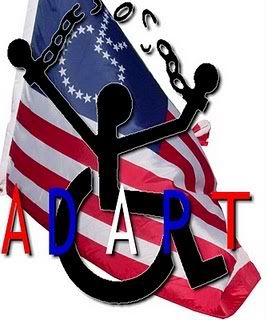I was looking for this exact picture for my postcard and I googled and it was still online here even after over 8.5 years since it was written. The article was written for a local newspaper. I was in MEL from Sept 2001-June 2003 (10th-12th grade) and was interviewed for the article. I think that little bit of hair you can see furthest away is my hair! I owe all my success in disability advocacy/activism to this program and Judy Webster. Oh, and Robert [that's him in the picture along with Jill & Mawadda. I think Carla is the half a face & Keith is the other bit of hair] got in trouble for that remark. Setting a bad example...
Challenged teenagers from Montgomery Exceptional Leaders share their stories
 In their own voices or through an interpreter, in halting or quick tones and with or without the help of a temperamental microphone, members of Montgomery Exceptional Leaders made their voices heard last week at a Germantown middle school.
In their own voices or through an interpreter, in halting or quick tones and with or without the help of a temperamental microphone, members of Montgomery Exceptional Leaders made their voices heard last week at a Germantown middle school.
The 10 teenagers represented a contingent of the group, known as MEL, which takes disabled students from high schools across the county and teaches them to share their story with others.
Judy Webster, the program's coordinator, said participants learn leadership and advocacy skills as well as public speaking.
"Because these students, everyone but especially these students, will need to advocate for themselves," Webster said. "[To] let people know what they can do and what they need to do it."
And that is what the students did at Dr. Martin Luther King Middle School.
Lined up on stage, they represented a wide range of challenges. Some were evident, as the students used wheelchairs or interpreters, but others were more subtle, and the assembled eighth-graders were sometimes invited to guess at the particular disability.
The students spoke frankly of the hurt and frustration of being teased and feeling behind in classes, but also about how they had dealt with these issues and what their hopes were for the future.
They explained the accommodations made for them in school, including elevator keys, note takers or a quiet room to take tests, and how all of that helped. But most of all, the students emphasized the significance of being accepted and understood by others and the importance of striving for dreams.
It was that positive message that led parent Brenda Martin, whose own daughter suffers from learning disabilities and Tourette syndrome -- a neurological disorder characterized by outbursts and tics -- to arrange the visit to King.
"These kids are so good as examples because they're cool with their disabilities," she said.
For most of the hour-long presentation, the audience listened quietly but other times the speakers drew laughter, questions and supportive comments.
Robert Tomlinson, a senior at John F. Kennedy High School suffering from cerebral palsy -- a chronic disorder impairing control of movement -- joked with the students. He demonstrated the benefits of his wheelchair -- its speed and reclining back, for example, "that's supposed to help me rest my back," Tomlinson said, "but sometimes I just don't feel like participating in class."
The audience cheered appreciatively.
Montgomery Exceptional Leaders visit about two elementary or middle schools each month once they have their speeches down, Webster said. They also produce a video and conduct workshops with support from the Association of Retarded Citizens.
"The goal is to have schools use a MEL visit in very constructive ways to promote awareness of disabilities and teach advocacy to all students," Webster said. Teachers receive classroom materials to help them follow up on the messages they hear in the presentation, which are aimed at listeners of all kinds.
"Just because I have learning disabilities doesn't mean I don't want to do the same things you like to do," Debra Wilensky of Wootton High told the students.
Said Joanna Yen, a Wootton senior with cerebral palsy: "If you have a disability, don't be afraid, because if I can do it, you can do it too."
King Principal Carrie Miller was "very impressed with the students who came out to visit us. ...You could tell from the audience behavior that they were absorbing."
The teenagers who make up MEL believe they both educate their audience and gain confidence themselves as they share their stories.
"First thing when we had this meeting is that we had to accept this disability," said Carla Mendes, a junior at Churchill High with a speech and language disability. "We had to accept it and realize that it was just nature and that made it easier."
The disabled students then pass that feeling on, Mendes said. "Giving the message to the kids, it's a real eye-opener, seeing how the world is," she said. "It shows them that everyone is normal, they're just different."
"I think they [the audience] walk away with some messages, even if it's just for one day or one week," said Jill Bayder, a senior at Churchill who spoke about her problems with depth perception.
Marci Michael, a teacher for the deaf at Rockville High School, has been involved with the MEL program for five years and has seen it change lives on both sides. She remembered one student in particular who had difficulty dealing with his disability before becoming involved with the group.
"He has absolutely become more comfortable with himself and knowing he can be successful even with a difference," she said.
Eric Payne of Paint Branch High School is in his second year in MEL and said he no longer gets nervous when he speaks from his wheelchair about his cerebral palsy.
"I just share myself," he said.
From the stage, Payne emphasized his abilities rather than his disabilities, talking about his involvement in various groups.
"I think that being active is good because no matter what my limitations are, I try to do my best," he said. "I don't know what 'give up' means -- what that means is just because I can't do something doesn't mean I can't keep striving."

















0 comments:
Post a Comment